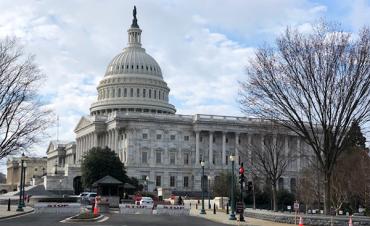From disaster relief to school funding to keeping kids safe, teachers are making a huge impact on a number of issues at the top of the nation’s news feed. Several AFT members explained how during a May 4 panel discussion on Capitol Hill sponsored by U.S. Rep. Mark Pocan (D-Wis.), the House Public Education Caucus and the AFT. They described just a few of the contributions educators make every day, in classrooms and communities across the nation, and urged legislators to listen to their stories and frontline expertise.
Bold teachers take bold steps in West Virginia
Stacey Strawderman, president of the Marion County AFT in West Virginia, described the bold steps teachers took at the beginning of the teacher movement there. Fed up with their everyday experience with outdated, under-resourced schools and salaries that were the 48th lowest in the 50 states, two young teachers took it upon themselves to begin a “West Virginia Public Employees United” Facebook page to educate the public about just how neglected public education has been in their state.
Drawing on a history of unionism that goes back to the coal mining industry, the movement took off from there, she said. Teachers took real risks to participate: Public schools are the largest employer in 41 of West Virginia’s 55 counties, and so the system has significant power. Yet teachers flocked to the state capital as part of a massive walkout and protest. The increases in public school funding won by the teachers will make a tremendous impact, though there is much more to be done. The teachers are continuing their activism, said Strawderman, “keeping solidarity alive” and getting out the vote for pro-public education candidates.
Supporting students who fight gun violence
Albuquerque Teachers Federation President Ellen Bernstein explained how teachers have also made their voices heard as part of the fight for anti-gun-violence legislation. After the tragic shootings in Parkland, Fla., teachers around the country began sharing stories about the impact the shootings had on their students. “Sometimes just a knock on the classroom door will send students into a panic, wondering if it’s someone with a gun on the other side of the door,” Bernstein told the panel.
And so teachers rallied to support the student-led demonstrations and walkouts: The Albuquerque Teachers Federation passed a formal motion pledging to support them. They convinced school district administrators to allow Albuquerque students to participate in 17 minutes of silence, one minute for each victim who was killed (and a remarkable amount of time for middle-grade students to be still, Bernstein remarked). Bernstein spoke at a student-led anti-gun violence rally that attracted 8,000 to 10,000 people marching in the streets. And her local developed an anti-gun-violence plan that holds elected officials accountable, works to elect anti-gun-violence candidates, and opposes arming teachers or militarizing schools.
Rebuilding after the storm
When hurricanes Irma and Maria slammed into Puerto Rico just two weeks apart last fall, teachers were among the first to help clean up, said Grichelle Toledo Correa, acting secretary general of the AFT-affiliated Asociación de Maestros de Puerto Rico-Local Sindical. Even when their own homes were damaged or destroyed and they had no electricity or clean water, they salvaged what they could of the school buildings, then helped turn them into community centers where they served meals and created spaces for social workers and counselors to help families apply for federal emergency assistance.
An influx of AFT nurses from New York and Oregon pitched in to distribute water filters as part of the AFT’s Operation Agua.
The work continues, as teachers in Puerto Rico fight to keep their public schools open and the union protests efforts to establish more charter schools and a voucher system there, Toledo Correa said. And teachers on the mainland are also playing a part, welcoming Puerto Rican students who have fled the island and helping them adjust to a place far from home.
Of course, there are many more stories like these playing out across the nation, as teachers continue to serve their students and their communities, but they need support from legislators. “Elected officials need to stand with us and for us,” said Donna Chiera, president of AFT New Jersey and chair of the AFT Teachers’ program and policy council, who fielded questions from several congressional offices.
The session ended with an “ask”: Bernstein urged lawmakers to continue to listen to the stories of educators on the ground. “Listen to public school union teachers,” she said. They have the knowledge, firsthand, of what students need most.
[Marjorie Brown, Virginia Myers]

